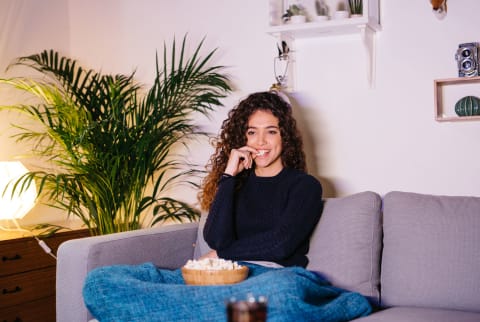Advertisement
What It Might Mean If You Love (Or Hate) Scary Movies, From A Clinical Psychologist


For some of us, nothing compares to a good horror film. We know it's fake of course, and perhaps that's why it can feel so liberating: We get to expose ourselves to the darkest, scariest side of human nature, without any actual fear of harm or guilt.
But still, why would we enjoy this? And what does it say about us if we love (or hate!) horror movies?
Each person and situation is different of course, but as a clinical psychologist, I have a few thoughts on potential reasons why some of us love nothing more than getting spooked out of our minds by a scary movie:
They grip our attention.
For those of us who have a high capacity for psychological dissociation—which connects to the ability for "suspension of disbelief" that lets us get lost in a book or movie—scary movies can take an extreme hold on our attention.
For those couple of hours, we're experiencing the same super-spike of mental and physical focus that Mother Nature gives us to deal with actual threats. This attention-gripping sensation almost forces us to take a break from whatever day-to-day worries or concerns might otherwise gnaw at us.
On the other hand, if our capacity for dissociation and absorption is extremely high, we might find scary movies too stimulating—especially if we keep thinking of them and feeling genuinely fearful for days later anytime we're in the dark, alone, or whatever the "hook" was from the scary movie.
They turn us on.
Scary movies amp up our bodies with heart-racing, breath-holding thrills, which actually primes us for sexual arousal. In fact, the neurological circuits that make us tremble and sweat with fear overlap with the neurological and bodily circuits that activate when we tremble and sweat with sexual arousal.
This is probably why horror movies are often a popular choice for date night: They rev up our arousal system precisely when we're in the perfect situation to jump into the ready arms of our partner, who is likely feeling equally stimulated.
They make it safe to explore.
Horror movies are a safe way to satisfy the "shadow side" of human nature, as part of a psychological defense called "sublimation"—where we find socially acceptable outlets for sides of ourselves that would be taboo if expressed in a raw, unfiltered manner.
This is actually considered a very healthy thing to do: For example, psychoanalysts sometimes speculate that surgeons may sublimate unconscious violent urges through the socially acceptable (and extremely helpful!) process of slicing into people on the surgical table; or that a boxer in the championship ring has found a socially acceptable arena of catharsis for violence.
Horror movies can do this for us on a much smaller, milder scale: They are a socially acceptable, benign way for us to mentally experiment with our darker sides. These films also offer us the chance to do so in connection with friends and family, which can create calming reassurance that this aspect of ourselves is actually quite "normal" and harmless.
The takeaway.
Remember: Each person and individual situation are different, and we do change over time. For example, tendencies toward dissociation can change with age, along with conscious or unconscious interests in social taboos—all of these factors can affect the way we'll process a scary movie.
Of course, exposure to actual trauma can strongly affect the way we experience horror—and not always in the way we'd first imagine. While frightening films may trigger PTSD for some trauma victims, research suggests that others may find it empowering to expose themselves to fearful stimuli while knowing they're actually safe (check with your doctor or therapist if you're unsure about this and need guidance).
The important thing is to know that movies—including scary ones—can be a great way to explore, transport, or simply entertain yourself. Just remember, you're in charge, and you should never feel compelled to watch a movie that truly bothers you or makes you feel genuinely uncomfortable. Scary movies aren't for everyone. However, if you do enjoy spooky flicks, don't be afraid to let them cast a satisfying spell on you.
To learn more about the power of the mind and how to use it to your advantage, check out my book, Nervous Energy: Harness the Power of Your Anxiety.